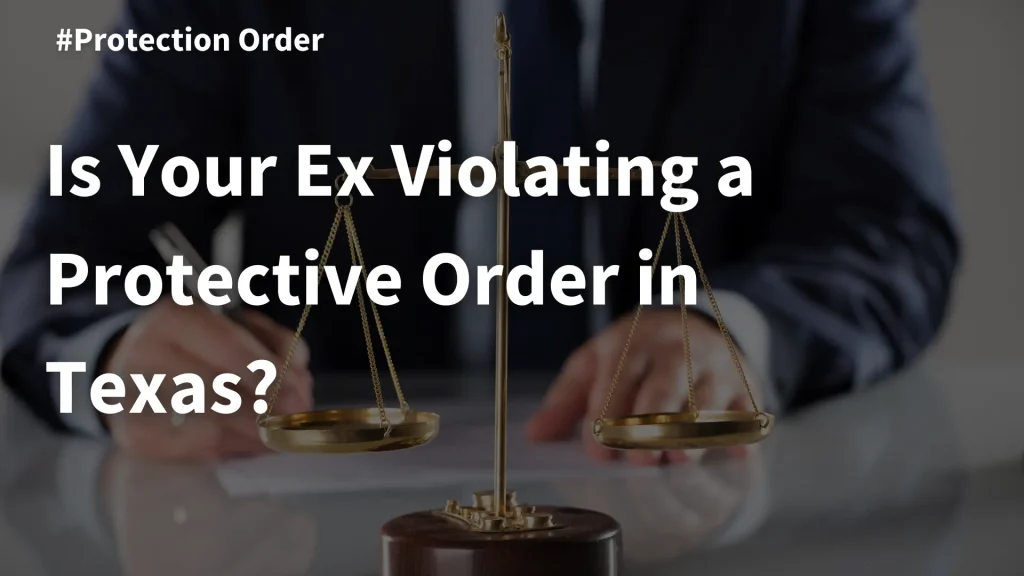When an ex-partner or spouse commits acts of domestic violence or harassment against you, you might obtain a protective order from the Texas courts to prevent future acts of violence, abuse, or harassment. Unfortunately, some people subject to protective orders violate the terms of those orders to continue abusing or harassing an ex. What legal rights and options do you have if your ex is violating a protective order in Texas?
You can best protect your legal rights and safety by reporting violations to law enforcement or the court as soon as possible. Police can investigate alleged violations, and the court can implement consequences upon your ex for violating the protective order, including fines, jail times, revised conditions in the protective order, or extensions of the order’s duration in response to felony offenses or your ex’s incarceration during the term of the protective order. Talking to an experienced family law attorney can help you protect your rights and interests before responding to an ex’s violation of your protective order.
Understanding Protective Orders in Texas
Under Texas law, a court may issue a person a protective order when they’ve experienced family violence inflicted by a family or household member or a current or former dating partner. Family violence can include an act that causes physical harm, injury, abuse, or sexual assault or threatens a victim to place them in fear of imminent harm or injury. A court may issue a temporary protective order that remains in effect until the court can hold a hearing with an alleged perpetrator and victim of family violence to determine whether family violence has occurred and the need for a permanent, general protective order. General protective orders typically remain in effect for up to two years unless terminated earlier by the terms of the order or a separate court order.
What Does a Protective Order Require of an Abuser or Harasser?
A protective order can place various obligations and restrictions on a person who has committed family violence. Typical provisions of protective orders in Texas may require the subject to:
- Complete a battering intervention or prevention program or begin counseling with a provider in the accreditation process or a social worker, family service agency, physician, psychologist, licensed therapist, or licensed professional counsel who has completed family violence intervention training
- Refrain from committing future family violence
- Refrain from communicating with a person protected by the order or a member of the person’s family or household, except to communicate through counsel if authorized by the court
- Refrain from making or communicating threats to a person protected by the order or a member of the person’s family or household
- Refrain from going to or near the home or place of business or employment of a person protected by the order or a member of the person’s family or household
- Refrain from engaging in conduct designed to annoy, harass, alarm, abuse, torment, or embarrass a person protected by the order or a member of the person’s family or household
- Refrain from possessing a firearm, except if the person serves as a sworn, full-time paid peace officer of a state agency or political subdivision
- Refrain from tracking or monitoring the personal property or vehicles of a person protected by the order or a member of the person’s family or household, whether through using electronic tracking technology, physically following them, or arranging for another person to physically follow them
How Do They Protect Survivors of Abuse or Harassment?
Protective orders can also contain order provisions to manage the parties’ relationship, such as:
- Prohibiting a party from removing a child from the custody of another person named in the order or the court’s jurisdiction
- Prohibiting a party from transferring, encumbering, or disposing of property jointly owned by the parties
- Granting exclusive possession of a residence to a party and directing other parties to vacate the residence if jointly owned or leased by the parties, solely owned or leased by the party granted possession, or solely owned or leased by the vacating party if they have a child support obligation to a child of the party granted possession
- Requiring a party to comply with a child custody order or to make child support payments
What Happens If Someone Violates a Protective Order?

First, a court can hold a proceeding to hold a party in contempt of court for violating the protective order. A finding of contempt can result in the imposition of penalties such as a fine of up to $500 and a jail term of up to six months. Violating a protective order also constitutes an offense with penalties of up to $4,000 in fines, up to 12 months in jail, or both. Police and prosecutors can also bring separate criminal charges when a person’s violation of a protective order involves a criminal offense.
A person protected by a protective order may also file a motion to amend the terms of the order in response to an abuser’s or harasser’s violation of the protective order. A protected person can ask the court to impose additional or revised obligations that the court could have initially included in the protective order. However, a protected party cannot ask the court to extend the duration of the protective order beyond its stated or statutory expiration date. Instead, the court may extend a protective order if the person subject to the order committed a felony offense of family violence against the protected person or a member of the person’s family or household or serves a term of incarceration on the expiration date.
Contact Our Family Law Attorneys Today to Learn More About Texas Protective Orders
If your ex has violated the terms of a protective order by continuing to harass or abuse you, you deserve to pursue accountability and protection from the court. Contact Smith & Bledsoe Family Law today for a free case evaluation to discuss your legal options after your ex breaches their restrictions under your Texas protective order.
